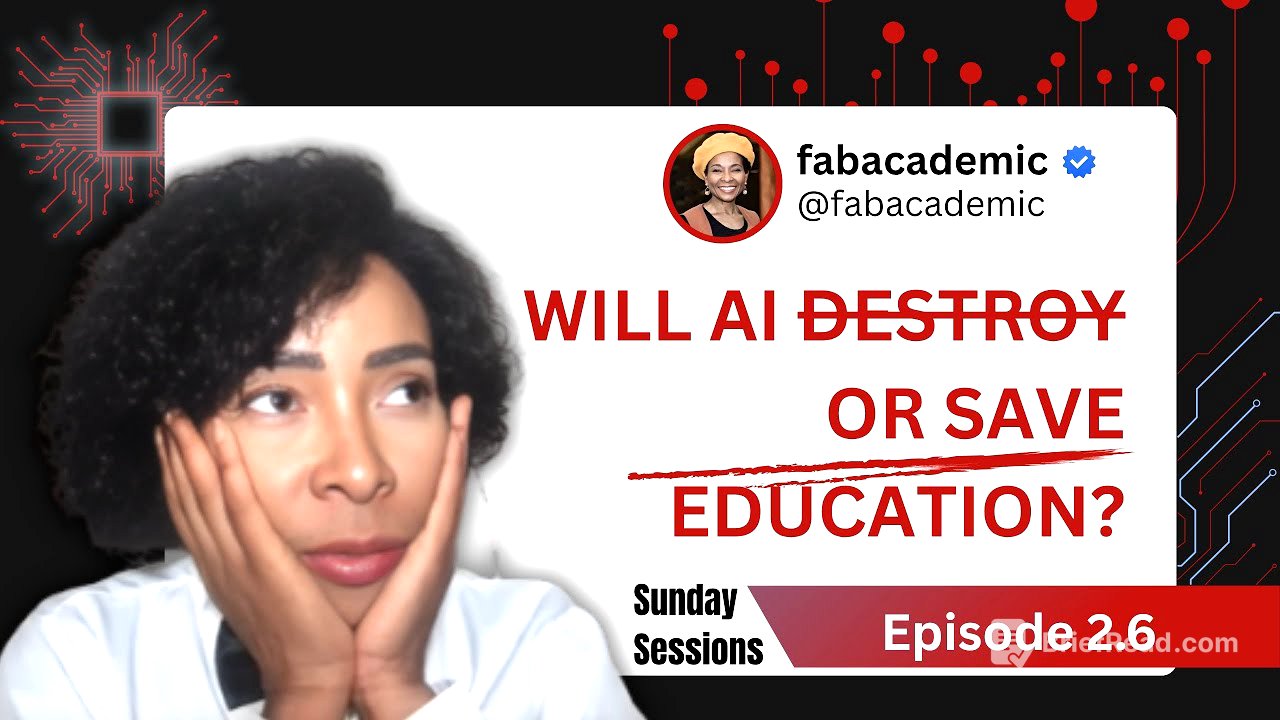TLDR;
This YouTube session, hosted by Prof Mamokgethi Phakeng, features a conversation with Professor Vukosi Marivate on the impact of artificial intelligence (AI) on education. They discuss whether AI will improve or worsen education, addressing concerns about AI's role in learning, assessment, and the widening inequality gap. The discussion emphasises the need for educators to adapt their teaching methods, integrate AI as a co-teacher, and promote AI literacy among students.
- AI presents both opportunities and challenges for education, requiring active engagement to reap its benefits.
- Educators must rethink assessment methods to focus on students' understanding and critical thinking rather than rote memorisation.
- AI literacy, computational thinking, and ethical scrutiny are essential skills for students to navigate the evolving landscape of AI in education.
Introduction and Welcome [0:01]
Prof Mamokgethi Phakeng welcomes viewers to the session on artificial intelligence, encouraging them to invite friends to join. She acknowledges the mixed reactions to AI, from fear to over-reliance, and highlights the importance of understanding its impact. Students from various universities and countries are welcomed, setting the stage for a discussion on how AI affects education.
Introducing Professor Vukosi Marivate [4:55]
Professor Vukosi Marivate, a professor of computer science and data science, is introduced as the guest speaker. His expertise in machine learning, AI, and natural language processing is highlighted, along with his dedication to improving data accessibility for local languages. Prof Phakeng assures viewers that Professor Marivate can explain complex topics in an accessible manner, setting the tone for an engaging discussion.
AI's Impact on Education: Improvement or Worsening? [10:53]
Professor Marivate suggests that AI's impact on education is not black and white, but rather a "state of being in the grey". He argues that while AI offers opportunities, these benefits require active effort, especially in developing countries. The technology challenges traditional teaching and learning methods, necessitating a re-evaluation of assessment and responsible AI use to enhance learning, not replace it. The goal is to ensure students learn and understand concepts, rather than simply achieving high scores through AI assistance.
AI's Role in Basic Education [13:51]
Professor Marivate discusses how AI can support basic education teachers without replacing their essential role. He highlights the importance of mother tongue education and the need for language tools, terminologies, and dictionaries in local languages. AI can assist in identifying appropriate vocabulary for different grade levels and creating resources for educators. He also acknowledges the challenges teachers face, including dealing with diverse student backgrounds, hunger, poverty, and inadequate internet access, emphasising that technology alone cannot solve these issues.
Addressing AI Use in Township Schools [20:16]
Professor Marivate acknowledges that AI has been present for decades, but its current accessibility raises new questions. He shares how university educators are adapting by encouraging active learning and critical thinking. He suggests educators share strategies to engage students and promote active participation. One approach involves peer critique and using AI to evaluate work, fostering reflection and feedback. He warns against relying on AI detection tools, as they may become ineffective over time.
Reconceptualising Education with AI [25:58]
Professor Marivate suggests universities should assume AI is present and integrate it as a co-teacher or learner. He shares an example of a PhD student's work on using AI to provide individualised feedback on experiential learning assessments. This approach aims to improve the quality of assessment and provide learners with valuable insights for reflection. He stresses the importance of developing AI tools with local context and involving educators in the development process.
Redefining Education in the Age of AI [31:24]
Professor Marivate suggests that AI prompts a return to fundamental questions about the purpose of education. He encourages learners to reflect on why they learn and how they can enhance their understanding to contribute to society. He shares personal examples of learning in linguistics, African history, and legal frameworks to contextualise his work in computer science. He emphasises that learning should be driven by a desire to solve problems and make a contribution, rather than solely for exams or certifications.
The Connection Between Learning, Certification, and Social Mobility [35:37]
Professor Marivate acknowledges the established link between education, certification, and social mobility, which complicates the question of why people learn. He notes that many graduates struggle to articulate their skills and how they can contribute to a workplace. AI further complicates this by offering a perceived shortcut, while some teachers continue to use outdated teaching and assessment methods. This situation raises concerns about whether AI is ruining education by making it less challenging and relevant.
The Realities of Higher Education and AI's Impact [38:12]
Professor Marivate discusses the challenges of equipping students with critical thinking skills in the context of large class sizes and societal realities. He reflects on the early days of massively open online courses (MOOCs) and notes that those who already had university degrees were more likely to complete them, as they understood why they were learning. He suggests that AI may benefit those who are already better educated, potentially widening the inequality gap.
AI and Widening Inequality [42:49]
Professor Marivate draws parallels between AI and the internet, noting that both can widen the inequality gap. He explains that individuals with higher education and income are better equipped to navigate and utilise these tools effectively. He provides examples of how the internet can be used for problem-solving and entrepreneurship, but also acknowledges that many people may only use it for basic communication. He stresses that AI requires critical thinking and the ability to apply it to real-world problems, which may leave some individuals further behind.
Advising Research Students on Using AI [45:46]
Professor Marivate advises research students to use AI as an assistant rather than a know-it-all. He cautions against blindly accepting AI-generated content and encourages students to critically evaluate and synthesise information. He compares AI to a search engine, which can assist in identifying relevant resources but requires the user to understand and interpret the information. He stresses the importance of reading, understanding, and arguing with AI tools to develop critical thinking skills.
The Need for AI Literacy [50:12]
Professor Marivate supports the idea of making AI literacy mandatory, alongside math literacy and computational thinking. He suggests that computational thinking, which involves understanding how computers process information, should be a basic human skill taught in basic education. He emphasises that AI literacy should also include ethical scrutiny, as AI can be used to create misinformation and manipulate information. He stresses the need for laws and systems to protect against bad actors and promote responsible AI use.
Ethical Use of AI in Curriculum [56:11]
Professor Marivate shares that ethics and computing ethics modules are now included in many AI and data science programmes. He highlights the importance of inclusivity, responsibility, and sustainability in AI development. He suggests that students should be taught how to identify potential misuse and act ethically. He argues that ethical considerations should not be limited to data science courses but should be integrated into all disciplines from the first year of university.
Conclusion and Final Thoughts [59:24]
Professor Marivate encourages viewers to explore the Data Science for Social Impact lab and the Deep Learning Indaba conference. He advises students to learn continuously and develop their understanding and skills. Prof Phakeng thanks Professor Marivate for the insightful conversation and reiterates the importance of asking "Why do you learn?" and "Why do you teach?" She encourages educators to integrate AI into their teaching methods and assess students' critical thinking skills. She concludes by urging viewers to make the most of their time and contribute to a better future.









